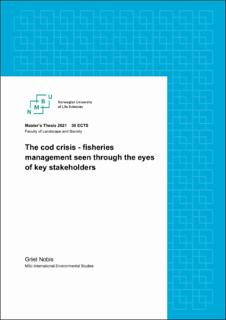| dc.description.abstract | Millions of people rely on the ocean and its resources for food and livelihoods. Many fisheries are however greatly impacted by human action and at risk of overexploitation. The environmental changes and pressure on the ecosystem call for sustainable natural resource management practices. While they should be defined by resource users and based on the best and most holistic knowledge possible, in many cases it is evident that the condition of the natural resource is worsening. The actions taken have not been sufficient or correctly targeted to secure the stocks. Understanding stakeholders’ perspectives about the resource and its current management regime can provide information about their limitations and beneficial aspects. In this thesis, qualitative interviews with stakeholders of Atlantic cod (Gadus morhua) in the Skagerrak facilitate exploration of the current management system. The application of the Knowledge-Action Framework by Nguyen et al., leads to greater understanding of the dynamics between knowledge production and knowledge action. Involvement of multiple stakeholders facilitates thorough understanding of perspectives regarding the status of the populations and the reasons for their decline. There is general agreement about the poor state of the cod stocks. Overfishing and climate change were identified as the main perceived reasons for the population decline. Further understandings of the reason for declines differed. Stakeholders raised more limitations than advantages within the management system. The main limitations identified were within the ‘relational dimension’, the ‘characteristics and perceptions of actors’, and the ‘characteristics of knowledge’. Therefore, most participants experienced communication, collaboration, and attitudes and knowledge of other actors as the main factors limiting successful management. The lack of knowledge about the resource was an additional element. Greater stakeholder involvement can help to overcome these limitations, as it can improve relations, lead to increased social justice of resource users, and contribute a variety of knowledge. Most recently, the management of the Skagerrak is more anticipatory and includes more stakeholders, which is a move in the right direction. However, even greater involvement of stakeholders will likely be beneficial. These advantages of greater stakeholder participation point towards knowledge co-production as a suitable strategy for improving this management system. | en_US |

